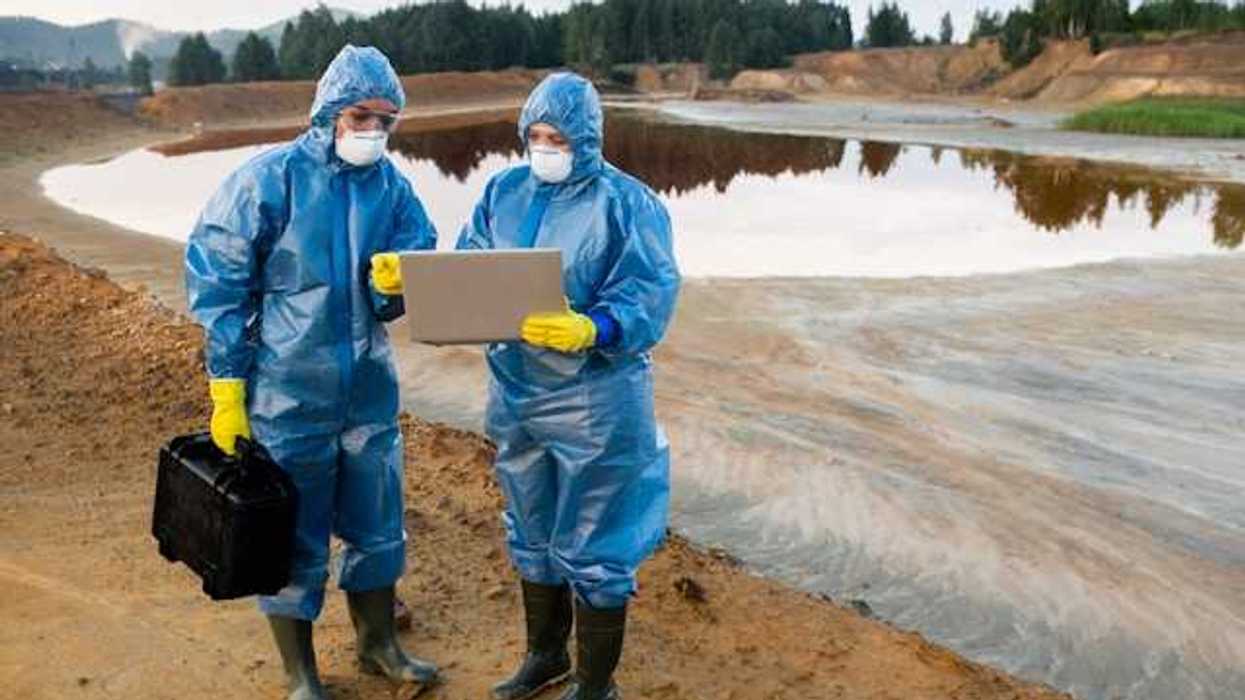It is certainly out of the ordinary for a delegation of scientists to ask a European Commissioner to lower public health protection. But if the reason given is to "block" an "onslaught of pseudoscience”, the step is unprecedented. In early May, seven scientists made a visit to the European Commissioner for Health, Vytenis Andriukaitis. They came to warn him, a press release from the University of Constance explained, about the "deliberately selective" way in which "some scientists" (who are not named) have presented the issue of endocrine disruptors to the public and the European Commission.
Neither the subject nor the timing are innocuous. The regulation of this entire class of chemicals has been the subject of an intense lobbying battle for almost ten years, the final meetings have taken place during these last few days at the Commission. It is the Directorate General for Health and Food Safety (DG SANTE), headed by the Lithuanian Commissioner, that is responsible for deciding the degree of severity of the measures.
Although the Commission has four options set out in its official "roadmap", only two of them are really being considered. In fact, all tensions are crystallized around a single question: should endocrine disruptors be categorized on the basis of the potency of their effects or not? Nestled away in option number 4, this mention of "potency criterion” is actually a lobbying trick worked out by the chemical and pesticide industries in 2009. By surrendering the most obvious endocrine disruptors, it would allow them to limit the damage of regulation that is now inevitable.
Scientific experts in this field vigorously reject the idea. "The potency criterion has no justification from a scientific point of view," said Andreas Kortenkamp of Brunel University, London. "It's an unfortunate mixture of regulation with commercial interests where public health is the loser.”
This professor of human toxicology, whom the Commission asked repeatedly for his independent expertise, has no ties with industry. And he is not the only one to take this position. Along with other prominent researchers in the field, he recently co-signed a paper to be published in the leading international journal on environmental health, Environmental Health Perspectives. "The concept of potency is irrelevant to the identification of the hazards such as endocrine disruptors," they wrote.
"Pressure groups"
This same conclusion was also taken in a consensus document discussed in mid-April in Berlin among scientists artificially separated into two "camps". In 2013, the European Commission had put forward an absence of scientific consensus as its official pretext for postponing its decision. In fact, the controversy was created by the protests of some 60 personalities who complained in high places about the “unfounded” use of a precautionary approach supported by DG Environment, which has since been removed from the case. Most of these individuals had never published any work on endocrine disruptors. However, the vast majority (50 out of 68) had links with the industry.
Might the recent visit of the seven scientists to Brussels represent some kind of repetition of this episode? Because once in the office of the Commissioner for Health, and barely a fortnight after the Berlin discussion in which three of them were participants, this delegation of scientists argued the exact opposite of what had been agreed there. They emphasized "the importance of potency and human exposure". While the World Health Organization’s landmark report published in 2013 speaks of endocrine disruptors as a "global threat", this band of seven even questioned the possibility that these substances have an effect on health. They spoke of a lack of "robust scientific evidence base", “dogmatic stance", used the adjective "nonsensical", and more surprisingly for scientists, they referred to "the competitiveness of the European economy."
"The tone—unnecessarily aggressive—aims to give the impression that there are several camps," lamented Rémy Slama, an epidemiologist at INSERM (French Institute of Health and Medical Research) and chairman of the scientific committee of France’s research programme on endocrine disruptors, who is without links to the commercial sector. "It implies that independent scientists are manipulated by some pressure groups, which is difficult to accept from a group of researchers most of whom do not hide their links with industry."
Aside from the fact that the meeting on Tuesday, May 3, took place before the Berlin consensus document was finalized (May 4), the question remains: in whose name were these scientists speaking? The German Federal Institute of Risk Assessment (BfR) refused to provide Le Monde with the declarations of interest that were filled out by all participants at the Berlin meeting. These forms are, however, public documents, including at the BfR. Le Monde’s own investigation shows that six of the seven scientists are closely related to industry and collaborate with firms such as BASF and Monsanto or with the asbestos and tobacco industries.
According to our sources, DG SANTE had already chosen in favour of the option that is most favourable to industry and which would leave most endocrine disruptors on the market.
Conflicts of interest: 7 scientists under the microscope
Even if they claim to have decided themselves to make the excursion to Brussels, the seven scientists had their expenses paid by the European Risk Forum (ERF), a think tank created by the tobacco industry in the 1990s to counter bans on smoking in public places. In 2016, ERF was funded by eighteen members: from the chemicals and pesticides sector—BASF, Bayer, Dow, Syngenta, CEFIC, IFAH-Europe (veterinary medicine) and PlasticsEurope; the tobacco industry—British American Tobacco, Philip Morris International; metals—Nickel Institute, Norilsk Nickel Europe; and the toys lobby (TIE).
Six of these seven scientists collaborate with industries affected in some way by the regulation of endocrine disruptors:
Helmut Greim
Emeritus Professor of Toxicology, Technical University of Munich (Germany). Initiator of the meeting with the Health Commissioner. Study for BASF on epoxiconazole, an endocrine disrupting fungicide (2014). Member of a Monsanto expert group on glyphosate (compensation: 3,000 €). Consultant for Unifrax (formerly St Gobain), a company marketing asbestos-like fibre insulation materials (1,250 € per day). Scientific committee member of ECETOC, a chemical industry organization(1,000 € per day). Chair of the Research Board of an organization of the German car industry (EUGT) since 2007. Until recently, his wife Heidrun owned a toxicology consulting firm, EuroToxis, with industry as clients.
At the same time, Mr. Greim is a member of the EU Scientific Committee for Occupational Exposure Limits (SCOEL) to which he has not reported some of these activities.
Colin Berry
Emeritus Professor of Pathology, Queen Mary University of London (UK). Member of the same Monsanto expert group on glyphosate (2015). Consultant "paid by the hour" for Syngenta (since 2010). Consultant for the vinyl industry: with expert responsibility for phthalates (which are endocrine disruptors) to the European Chemicals Agency on behalf of industry (2012). Member of the expert pool of CropGen–a front organization for the biotechnology industry created by the public relations firm Porter Novelli International. Scientific advisor to the American Council on Science and Health (ACSH), an industry front group with funding in 2012 from Bayer CropScience, Syngenta (pesticides and biotechnology), Bristol Myers (medicines), Coca-Cola, Dr Pepper, etc. Expert witness representing Philip Morris (1997).
Alan Boobis
Professor of Pharmacology, Imperial College London (UK). Chair of the Board of Trustees and Executive Committee of HESI, a lobbying organization funded by food, agrochemical (including Monsanto) and drug manufacturing industries, etc., via the International Life Sciences Institute (ILSI),where he held various positions, such as vice-president of the Europe branch. Consultant for Coca-Cola and involved in its campaign "thirst for knowledge" on sweeteners (2012-2014). A consultant to AstraZeneca and GSK laboratories, the law firm Duane Morris and the chemical firm Endura.
Collaborated in two research projects funded by the Long-range Research Initiative of the European Chemical Industry Council (CEFIC): one on risk factors for breast cancer amounting to 75,250 € (2010) and the other on doses with no observed toxic effects in animals and humans amounting to 135,000 € (2012-2014).
On May 17, Dr. Boobis chaired the JMPR, a joint expert committee of the World Health Organization (WHO) and the Food and Agriculture Organization (FAO), which provided an opinion minimizing the carcinogenic risk of glyphosate, a pesticide marketed by Monsanto under the name RoundUp.
Wolfgang Dekant
Professor of toxicology at the University of Würzburg (Germany). Representative of the flame retardants industry (BSEF)—which are neurotoxic and endocrine disrupting chemicals—at a meeting of the International Agency for Research on Cancer (February 2016). Expert with responsibility on phthalates for the vinyl industry (along with Colin Berry, 2012).
Until recently a member of several European scientific committees, he declared eighteen consultant contracts for undisclosed clients.
Daniel Dietrich
Former adviser to ECETOC, a chemical industry research organization. Co-author of articles with employees of L'Oréal ("Endocrine disruption: fact or urban legend?" 2013), Dow Europe and AstraZeneca, and Bayer Healthcare.
Pat Heslop-Harrison
Professor of Plant Cell Biology and Molecular Cytogenetics, University of Leicester (UK). No known links with industry. No scientific publication on endocrine disruptors.
Richard Sharpe
Professor and Director of a Research Team on male reproductive health at the University of Edinburgh, UK. GSK shares. Consultant for Johnson & Johnson (2011-2012). Member of a BASF scientific board (2011-2013) to conduct a study on epoxiconazole for a fee the amount of which he “did not remember". Moderator at a breakfast meeting sponsored by BASF in the European Parliament ("Who regulates our hormones?" January 2015).
Le Monde was able to contact Alan Boobis, Helmut Greim and Richard Sharpe; the others did not respond to our requests for comment.














